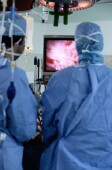Newer Anticlotting Drug Safe, Effective for Heart Surgeries
Bivalirudin lowers bleeding risk for patients undergoing bypass, study finds.
By Ed Edelson
HealthDay Reporter
|
E-mail this article
Subscribe to news
Printer friendly version
|

(SOURCES: Gregg W. Stone, M.D., professor of medicine, Columbia University, New York City, and director of the Cardiovascular Research and Education
Center for Interventional Vascular Therapy, New York-Presbyterian Hospital/Columbia University Medical Center, New York City; A. Michael Lincoff, M.D., director, cardiovascular research, Cleveland Clinic; Christopher Granger, M.D., professor of medicine, Duke University Medical Center; Dec. 5, 2007, Journal of the American Medical Association)
TUESDAY, Dec. 4 (HealthDay News) -- A newer kind of anticlotting drug is safe over the long run when used during coronary emergencies such as heart attacks.
The drug, a "direct thrombin inhibitor" called bivalirudin, is used to keep blood flowing freely during cardiac procedures such as bypass surgery.
"We had a lot of success reducing complications with this class of drug," said study co-researcher Dr. A. Michael Lincoff, director of cardiovascular research at the Cleveland Clinic.
The team reported its findings in the Dec. 5 issue of the Journal of the American Medical Association. The study was funded by The Medicines Company of Parsippany, N.J., and the Danish company Nycomed, which have each helped develop bivalirudin.
The news may be important for the two million or more Americans who undergo bypass operations and similar procedures each year, Lincoff said. Bivalirudin not only reduces the incidence of excess bleeding that can be associated with anticoagulant use, it also is less expensive than older anticoagulant drugs, he said.
Those drugs, called GP IIb/IIIa inhibitors, act on platelets, blood cells involved in clotting. The new agent used in the trial, bivalirudin (brand named Angiomax), acts directly on molecules such as thrombin that cause clotting.
"Previous studies with patients in elective situations have shown that bivalirudin was just as effective at reducing bleeding," Lincoff said. "The question was whether it held for patients with unstable heart disease over the long run."
The study looked at the use of anticoagulants in patients undergoing procedures for conditions collectively known as acute coronary syndromes.
First results of the trial, which included 13,819 people who underwent procedures at 450 institutions, showed no difference in outcomes within the first month after surgery. And the current report found no significant difference over the year that followed the procedure. For example, all-cause mortality was 3.9 percent for those using the older drugs versus 3.8 percent for those who got bivalirudin. The mortality rate for patients who got combined therapy with the older drugs and bivalirudin was 3.9 percent.
The major advantage of bivalirudin is that it decreases the incidence of excess bleeding -- always a problem when anticoagulants are used, Lincoff said. Excess bleeding during a procedure is associated with a higher risk of long-term mortality.
"About 4 to 5 percent of patients have bleeding complications from older anticoagulant use," Lincoff said. "With 1.25 million hospital admissions a year for acute coronary syndromes and over one million a year for non-emergency procedures, that is quite a large number."
Bivalirudin has a number of advantages over the older treatment, said Dr. Gregg W. Stone, professor of medicine at Columbia University and lead author of the journal report.
"It causes much less bleeding, it leads to less need for blood transfusions, it leads to more streamlined care and less expensive hospital costs," he said. "Now this new data coming in suggests that it can reduce mortality and save lives.
Stone said he is using the drug in about 95 percent of his cases. In the other 5 percent, fear that a blood vessel might rupture leads to use of heparin, an anticoagulant whose activity can be reversed quickly to prevent a major hemorrhage.
Dr. Christopher Granger, professor of medicine at Duke University Medical Center, said the one-year report is "important because it really reinforces what we learned from the 30-day report from the trial. Any differences in outcome seen early didn't result in changes in how we interpreted those outcomes in the long run."
The initial report showed a slight increase in blood vessel blockage and a 50 percent reduction in bleeding episodes with bivalirudin, Granger said. "The question was, does it make a difference?" he said. "The answer from this manuscript is that it doesn't. The effects neutralize each other.
"Bivalirudin is a particularly attractive option for patients showing up in the catheter lab early with a coronary syndrome," he said.
More information
There's more on acute coronary syndromes at the American Heart Association. 
Copyright © 2007 ScoutNews, LLC. All rights reserved. 
HealthDayNews articles are derived from various sources and do not reflect federal policy. healthfinder.gov does not endorse opinions, products, or services that may appear in news stories. For more information on health topics in the news, visit the healthfinder.gov health library.